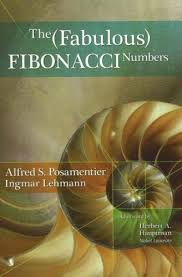Test if a number is fibonacci
I know how to make the list of the Fibonacci numbers, but i don\'t know how can i test if a given number belongs to the fibonacci list - one way that comes in mind is genera
-
Positive integer ω is a Fibonacci number
If and only if one of 5ω2 + 4 and 5ω2 - 4 is a perfect square
from The (Fabulous) FIBONACCI Numbers by Alfred Posamentier and Ingmar Lehmann
bool isFibonacci(int w) { double X1 = 5 * Math.Pow(w, 2) + 4; double X2 = 5 * Math.Pow(w, 2) - 4; long X1_sqrt = (long)Math.Sqrt(X1); long X2_sqrt = (long)Math.Sqrt(X2); return (X1_sqrt*X1_sqrt == X1) || (X2_sqrt*X2_sqrt == X2) ; }I copied it from this source
Snippet that prints Fibonacci numbers between
1kand10k.for (int i = 1000; i < 10000; i++) { if (isFibonacci(i)) Console.Write(" "+i); }OMG There are only FOUR!!!
With other method
from math import * phi = 1.61803399 sqrt5 = sqrt(5) def F(n): return int((phi**n - (1-phi)**n) /sqrt5) def isFibonacci(z): return F(int(floor(log(sqrt5*z,phi)+0.5))) == z print [i for i in range(1000,10000) if isFibonacci(i)]讨论(0) -
A very nice test is that N is a Fibonacci number if and only if
5 N^2 + 4or5N^2 – 4is a square number. For ideas on how to efficiently test that a number is square refer to the SO discussion.Hope this helps
讨论(0) -
This is my solution I'm not sure if it benchmarks. I hope this helps!
def is_fibonacci?(i) a,b=0,1 until b >= i a,b=b,a+b return true if b == i end endwhat a,b=b,a+b is doing
0, 1 = 1, 0 +1 1, 1 = 1, 1 + 1 1, 2 = 2, 1 + 2 2, 3 = 3, 2 + 3 fib1 = fib2 fib2 = fib1 + fib2讨论(0) -
#include <stdio.h> #include <math.h> int main() { int number_entered, x, y; printf("Please enter a number.\n"); scanf("%d", &number_entered); x = y = 5 * number_entered^2 + 4; /*Test if 5N^2 + 4 is a square number.*/ x = sqrt(x); x = x^2; if (x == y) { printf("That number is in the Fibonacci sequence.\n"); } x = y = 5 * number_entered^2 - 4; /*Test if 5N^2 - 4 is a square number.*/ x = sqrt(x); x = x^2; if (x == y) { printf("That number is in the Fibonacci sequence.\n"); } else { printf("That number isn't in the Fibonacci sequence.\n"); } return 0; }Will this work?
讨论(0) -
A positive integer ω is a Fibonacci number if and only if either 5ω2 + 4 or 5ω2 - 4 is a perfect square.
See The Fabulous Fibonacci Numbers for more.
 讨论(0)
讨论(0) -
Based on earlier answers by me and psmears, I've written this C# code.
It goes through the steps slowly, and it can clearly be reduced and optimized:
// Input: T: number to test. // Output: idx: index of the number in the Fibonacci sequence. // eg: idx for 8 is 6. (0, 1, 1, 2, 3, 5, 8) // Return value: True if Fibonacci, False otherwise. static bool IsFib(long T, out int idx) { double root5 = Math.Sqrt(5); double PSI = (1 + root5) / 2; // For reference, IsFib(72723460248141) should show it is the 68th Fibonacci number double a; a = T*root5; a = Math.Log(a) / Math.Log(PSI); a += 0.5; a = Math.Floor(a); idx = (Int32)a; long u = (long)Math.Floor(Math.Pow(PSI, a)/root5 + 0.5); if (u == T) { return true; } else { idx = 0; return false; } }Testing reveals this works for the first 69 Fibonacci numbers, but breaks down for the 70th.
F(69) = 117,669,030,460,994 - Works F(70) = 190,392,490,709,135 - FailsIn all, unless you're using a BigInt library of some kind, it is probably better to have a simple lookup table of the Fibonacci Numbers and check that, rather than run an algorithm.
A list of the first 300 Numbers is readily available online.
But this code does outline a workable algorithm, provided you have enough precision, and don't overflow your number representation system.
讨论(0)
- 热议问题

 加载中...
加载中...